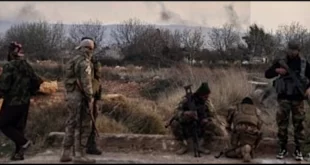Jul 20, 2015, Counter Punch
It is worth noting that the UK Parliament was against it, namely, enlarging a campaign against the Islamic State that would also involve targeting Syrian positions. The security cognoscenti were always insisting that any conflict with IS worth its salt would have to involve strikes in Syria.
In 2013, however, the Commons took to the vote and say nay to the issue of striking Syria. The issue then was a supposed “red line” on the alleged use of chemical weapons by the regime of Bashar al-Assad. Punishment by way of airstrikes was in order. President Barack Obama was making mutterings about authorising them, and the French were getting hawkish.
The house, however, would not be swayed, and the government motion was defeated by 285 votes to 272. Chancellor George Osborne was left to tell Radio 4’s Today programme that there would be “national soul searching about our role in the world”.
Be that as it may, intervention in Syria has continued to remain a rather stealthy, vicarious affair for those in the UK cabinet. The result is a dog’s breakfast of rationales as to who should receive British support, generally of a more covert variety. Assad continues to be worth deposing, but he remains a foe of IS, which has roared into the geopolitical front line with ruthless aplomb.
This week, it came to light that the UK involvement in Syria has gone well beyond what Parliament authorised. Initial authority had been given to UK forces to strike IS targets in Iraq. Those actions have also been shielded by Baghdad’s blessing. To date, however, UK Defence Secretary Mike Fallon has maintained that the embargo would remain on British strikes against Syrian positions, at least till Parliament said otherwise.
The human rights group Reprieve, was not convinced. Yes, it may well be that the planes used in the operations continued to be American – but that did not necessarily say much about the pilots involved in the missions. In a Freedom of Information request, the organization decided to dig deeper into what, exactly, the Ministry of Defence had been up to on the issue of air involvements.
In the words of Jennifer Gibson, Reprieve’s staff attorney, “UK personnel have already been involved in bombing missions over Syria for some time – making the current debate over whether Britain should carry out such strikes somewhat obsolete.” The avarice of executive power was very much in evidence.
A spokeswoman for Prime Minister David Cameron initially tried to sidestep the issue of whether British personnel had been involved by taking a leaf out of the book of vague and trusty protocol. Since the 1950s, it had been a “well known” practice that UK personnel had been embedded with allies. There were currently “upward of a dozen” such personnel operating in the campaign against IS.
Then, the clinching remark: “The PM was aware that UK personnel were involved in US operations and what they were doing.” To date, the air aspect of the campaign has been confined to logistical support for other Coalition forces, air-to-air refuelling missions and surveillance.
This, in effect, was not so much mission creep as mission stretch, with its fair share of dangerous consequences, despite efforts on the part of such figures as former chief of the air staff, Sir Michael Graydon, to suggest otherwise. As Tory backbencher John Baron opined on the Today programme, “we should be very sensitive to the fact that we have military personnel participating, in effect, in military intervention.” Tim Farron, the new Liberal Democrat leader, suggested that the move had effectively played “into the hands” of IS, a body ever keen to find more recruits.
Alex Salmond, the Scottish National Party’s foreign affairs spokesman, was distinctly unimpressed by this shadowy widening of conflict. “The Government’s policy in this matter is entirely unacceptable – effectively overseeing a bombing campaign by stealth – and we need to know what the defence secretary knew, when he knew it, and when he was proposing to tell the country. He clearly didn’t do so in the debate on 2 July.”
Salmond’s concerns have echoed the general scepticism about which warring horse to back in the conflict. Support for one faction, he suggested, would not necessarily lead to any “desirable” outcomes. Trite, but undeniable. “Experience tells us that interventions can have unforeseen consequences.”
Experience, however, tends to be the neglected sage in the rooms of policy makers, with the Middle East continuing to draw in the incapable, the blind and, ultimately, the anti-democratic.
 Syria Support Movement solidarity with the Syrian people
Syria Support Movement solidarity with the Syrian people




